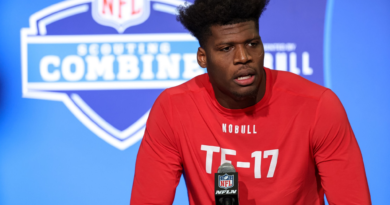CFP, ESPN agree to $7.8B deal through '31-32
The College Football Playoff and ESPN have agreed to a new six-year, $7.8 billion contract that ensures the network will remain the sole media rights holder of the event through the 2031-32 season, it was jointly announced Tuesday.
ESPN, which has held exclusive broadcast rights since the CFP began in 2015, will expand its package for the final two years of the current 12-year contract, which runs through the 2025-26 season. The CFP is unveiling a 12-team format for the 2024-25 season, and ESPN will add all four of the new first-round games each year to the network’s existing coverage of the New Year’s Six bowls (now the quarterfinals and semifinals) and the CFP National Championship game.
ESPN also secured a six-year agreement that will cost $1.3 billion annually beginning in the 2026-27 season and includes exclusive rights to all rounds of the expanded playoff along with continued exclusive rights to all programming connected to the CFP, such as the CFP selection show, weekly Top 25 ranking shows and more.
“ESPN has worked very closely with the College Football Playoff over the past decade to build one of the most prominent events in American sports,” ESPN chairman Jimmy Pitaro said in a statement. “We look forward to enhancing our valued relationship over the next two years, and then continuing it for six more as we embark on this new, expanded playoff era.
“This agreement further solidifies ESPN as the home of college football, as well as the destination for the vast majority of major college championships for the next eight years.”
The hefty price tag reflects the increase in games, as the current deal was originally constructed for seven games (including the New Year’s Six bowls and the national championship), and only three were actually playoff games (the two semifinals and the national title game). The new contract is built as either 11 or 13 games — all of which are playoff games — in a 12- or 14-team field.
“We feel really good about the value of what we’re getting in exchange for the financials being paid,” said Nick Dawson, ESPN senior vice president, college sports programming and acquisitions. “We firmly believe the event is going to be better, starting this fall at 12 teams, just in terms of how it’s going to captivate the country.”
Beginning in 2026-27, the CFP National Championship game will be broadcast on ABC in addition to ESPN’s MegaCast presentation. The new agreement includes expansive rights to simulcast or MegaCast CFP games across all Walt Disney Company platforms, including TWDC direct-to-consumer offerings.
Dawson said he doesn’t expect much to change in how the public watches these games and that ABC and ESPN will be the “primary vehicles moving forward with the deal.”
“There is a right and flexibility to do early-round games on direct-to-consumer streaming services, but as of now, no decision has been made on our side to even activate that right,” Dawson said. “A lot of this is future-proofing where the world goes over essentially eight years, and we feel really good about the flexibility we have, but in the near term, I don’t think fans would expect to see much difference in terms of how the games are distributed broadly across traditional linear television.”
The CFP format for this season and next will be five automatic qualifiers from the five highest-ranked conference champions and seven at-large bids. Last week, the nine FBS commissioners and Notre Dame agreed the playoff will include at least 12 teams in 2026 and beyond. The CFP has complete authority to determine the format.
While multiple sources have told ESPN the CFP is leaning toward a 14-team field, the number of teams and how they will qualify for the CFP hasn’t been determined beyond the next two seasons. There are protections in place for the ACC, Big Ten, SEC and Big 12 conference champions, Notre Dame and the highest-ranked Group of 5 champion in the new contract.
Dawson said the new TV deal specifically addresses 12- and 14-team models, but also includes “a mechanism to address if they expand beyond 14 teams.”
“I do think at some point you start to really impact the regular season and the conference championship games,” Dawson said. “I feel like they’ve done a great job so far of designing the 12-team model, and potentially even the 14-team model, although we’d still need to understand exactly what it looks like. … I do worry that the larger you get beyond that, I think it becomes almost impossible to avoid some damage being done there.”
The CFP has granted ESPN the right to sublicense a select number of games in both the amended two-year agreement and the new six-year extension.
“As we sit here today, no decision has been made on our side whether we’ll even pursue it or not,” Dawson said. “It’s simply a right in the deal as of right now.”
Before agreeing to the media rights deal with ESPN, the nine FBS commissioners and Notre Dame leadership had to first agree to sign a memorandum of understanding last week that outlined in broad terms what the next contract would look like. They agreed to move forward with a new revenue distribution plan that will codify the further financial separation of the expanded Big Ten and SEC from everyone else in college athletics.
The financial distribution for the expected 14-team playoff will look radically different. On an annual basis, for example, Big Ten and SEC schools will each be making more than $21 million — a drastic increase from the nearly $5.5 million that schools in Power 5 conferences are currently being paid.
In the ACC, the schools will get more than $13 million annually and Big 12 schools will get more than $12 million each. Notre Dame is expected to get more than $12 million as well and sources told ESPN there will be a financial incentive for any independent team that reaches the CFP.
There will no longer be a CFP participation bonus for any of the other leagues — a detail that was frustrating to some leaders in the Group of 5. The Group of 5 schools’ annual payments will increase to just under $1.8 million from the current $1.5 million.
For now, the CFP is treating Oregon State and Washington State as independent schools in 2026 and beyond. Given the conference’s uncertain status with 10 schools leaving next season, new Pac-12 commissioner Teresa Gould did not sign the memorandum of understanding last week or the new six-year deal with ESPN, but she did agree to the amended contract with the network for the 2024 and 2025 seasons.
Now that the revenue and media rights deal have been agreed upon, the most pressing question remaining is what the format will look like in 2026 and beyond. It’s unknown whether CFP leaders will let one edition of the 12-team field play out or decide on a format in the upcoming months. CFP and ESPN leaders are expecting the 12-team field this fall to generate even more interest among fans than in the past.
“We firmly believe this fall is going to be an exciting time for college football fans,” Dawson said. “The right balance between access and still capturing the best teams in the country I think has been achieved here, and we’re excited to roll it out this fall.”
The CFP has contributed to the most-watched days in ESPN’s nearly 45-year history, led by the first CFP semifinals in 2015 boosting ESPN to 11.6 million average viewers for New Year’s Day. The CFP semifinals in 2018, 2022 and 2024 anchored ESPN in rounding out the top four complete-day audiences in network history. College football on ESPN accounts for the top 15 and more than 50 of the top 100 most-watched cable programs on record (since 1987), with eight of the top 10 directly from CFP semifinals or national title games.
In 2023-24, ESPN’s expansive coverage of the CFP delivered a record year. The three-game CFP scored its most-watched matchups in six years (since Year 4) and was third best of the CFP era with 23.6 million viewers and 15% year-over-year audience growth across the trio of games. The CFP National Championship and New Year’s Six averaged 15.1 million viewers, the best audience in five years and fifth highest in the past decade of the CFP.
The agreement with the CFP marks ESPN’s second significant college sports media rights extension in 2024, following the eight-year deal with the NCAA in January that encompasses exclusive rights to 40 NCAA championship events. ESPN now boasts the exclusive domestic rights to every major college championship outside of men’s basketball and international rights to all major college championships.
“This new agreement solidifies the broadcast future of the College Football Playoff for many years to come,” said Mississippi State president Mark Keenum, chairman of the CFP board of managers. “ESPN has been a key piece of the overwhelming success of the playoff during these first 10 years. The addition of ABC to this expanded relationship is just the next step in the continued growth of one of the top sporting events of the year.”



